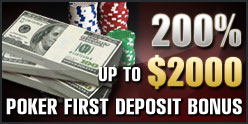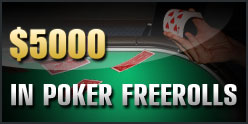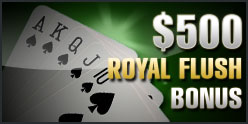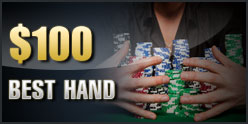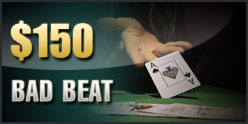The daily fantasy sports industry might be under fire at the moment, but the current controversies are likely to eventually die down, and we’ll be back to business as usual. Or, more likely, business as usual with government regulation.
The industry has exploded over the past two years, and the unicorn valuations of DraftKings and FanDuel are an indication that they’re doing something right. It seems to me online poker companies could learn a thing or two from the DFS industry.
Actually, there are four areas where I feel the online poker industry would be wise to follow the DFS industry.
You have to spend money to make money
To say DFS sites are willing to spend money on advertising is the understatement of the year. I’m not advocating for online poker sites to spend like drunken sailors on their first shore leave in six months, but it wouldn’t hurt to ramp up player acquisition efforts a bit, either.
It’s actually impossible for most online gaming companies to spend like DraftKings or FanDuel even if they wanted to, as most of them are public companies, with a board of directors and shareholders to answer to. But at some point there is some value in overspending for a short period of time. If done right, that money will return down the road.
Forget sponsoring players, aim higher
Online poker sites have a standard operating procedure of sponsoring poker players in order to advance their brand. The thinking is, these players (if they’re good) will get on TV wearing said site’s patch and BOOM: free marketing. However, the chances are still slim the TV cameras will find your player(s) unless you spend through the nose for a top talent like Daniel Negreanu or Phil Hellmuth. And let’s not lose sight of the fact that even at its peak, poker on TV wasn’t producing a massive viewership — it had good numbers, for cable.
On the other hand, DFS sites do sponsor athletes (sites like PokerStars, so as well), but the bulk of their sponsorship money goes towards deals with teams, leagues, and even stadiums. These same options are available to online poker sites (and some do sponsor shows or tournaments), if they’re willing to spend a bit more. PartyPoker NJ tried this, inking a deal with the New Jersey Devils, the Prudential Center, and the Philadelphia 76ers, but because of the size of the New Jersey market, and what I would call an inability to properly leverage the deal, the returns never materialized.
My advice: Go the DFS route and aim for the stars, casinos, poker rooms, poker tours, individual tournament series and so on. Structure the deals in the same way DFS companies do, where it appears the cost of the deal is more dependent on its success.
Don’t get me wrong, there are certainly poker players worth sponsoring, but by focusing on players, you’re limiting your reach, particularly if you sponsor multiple players as they almost certainly have overlapping followers, most of whom already have some interest in the game of poker.
If you want to reach a new audience, casino advertisements (outside the poker room) would seem to be the way to go.
Keep it simple
When poker was at its peak, new players logging on to a site for the first time had only a few options to choose from. Sites weren’t offering mixed games, Badugi, or PLO8. There were only a few different sit-and-go formats. And the tournament lobby didn’t need to be color coded.
Instead, they stuck to the bread-and-butter games, the games the casual players were interested in. Now, with online poker in a recession, operators are continually increasing their offerings. While I’m not against innovation, it seems like games and formats are constantly added, but none are ever removed. This has led to less “game liquidity” and a very confusing experience for new players who have to navigate lobbies that require multiple filters to read.
The idea of keeping it simple extends beyond game offerings, as well. Online poker websites need to simplify their rewards programs, the number and type of promotions they offer, and how they design their marketing efforts. If I were consulting with an online poker website, I would implement the 30-second rule, and I’m not talking about the one about eating food that has fallen on the floor.
The 30-second rule for online poker operators is simple; if you can’t explain your promotion in 30 seconds it’s too complicated.
When it comes to making games easy to understand, DFS has flourished. Everything about the game is simple. A first-time player can easily select a lineup, and there is very little fine print associated with any part of the process, as the sites pretty much have a first-time deposit bonus and that’s it.
On the other hand, online poker sites often have five or more promotions running simultaneously, all with kitschy names and loads of terms and conditions that require the prospective player to read through a subpage to understand. Then they get to the poker lobby and… WHAM… there are more table and game options than there are players on the site. I get that virtual space is cheap to inhabit, but when you go to a restaurant for the first time and they hand you a menu with 300 dishes, it’s a bit overwhelming.
If your game is good, people will play
For serious poker players in the early days of online poker, it was all about making money by beating your opponents at the poker tables. At some point this change; there was a fundamental shift in how a poker player profited. Once the games became harder to beat, players needed to find alternative ways to keep the online poker gravy train rolling on.
Instead of letting these lesser pros die off (they were only profitable for that brief period of time now known as the poker boom), the online poker sites came up with what seemed like an ingenious way to keep these players alive and kicking — offer them so many rewards that they could be a significant loser at the tables and still break even or turn a slight to decent profit, as long as they upped their volume, which is where the benefit for the site was, or so they thought.
Most poker players now look for sites where they can earn 30% or more in rakeback, and even more when you factor in VIP rewards and so on. Then they open up a ton of tables and play super tight, and let the rewards program be their profit.
My feeling is this was an overreaction by online poker operators. The games are now much tighter, slower and less fun. All of the rakeback grinders may still be plugging away at 16 tables 10 hours a day, but they don’t deposit, and they make the game frustrating for new players.
These rewards are also unnecessary. DFS sites currently offer modest deposit bonuses and rewards. You’re lucky to find a deposit bonus at a DFS site that clears at more than 4%. StarsDraft does have a VIP program where you can earn up to 18%, but the average player will be unlikely to get above 4%. Compare that to the 30% in rakeback online poker sites are constantly offering.
Not to mention DFS sites rake their contests by 10% or more, whereas online poker sites are loath to collect more than 5% in rake, and often far less.
It seems that if the game appeals to people, you can skimp on the lures. If your game is boring, it might be a better idea to fix the mechanics of it rather than give away the store.




